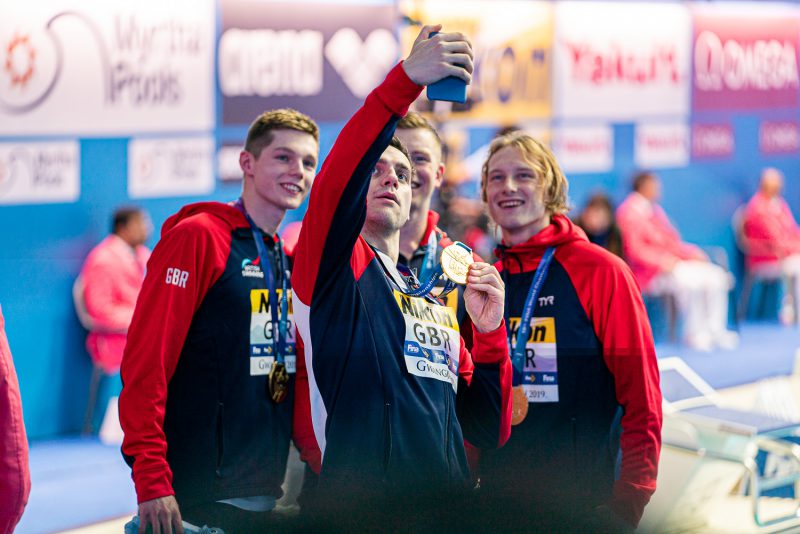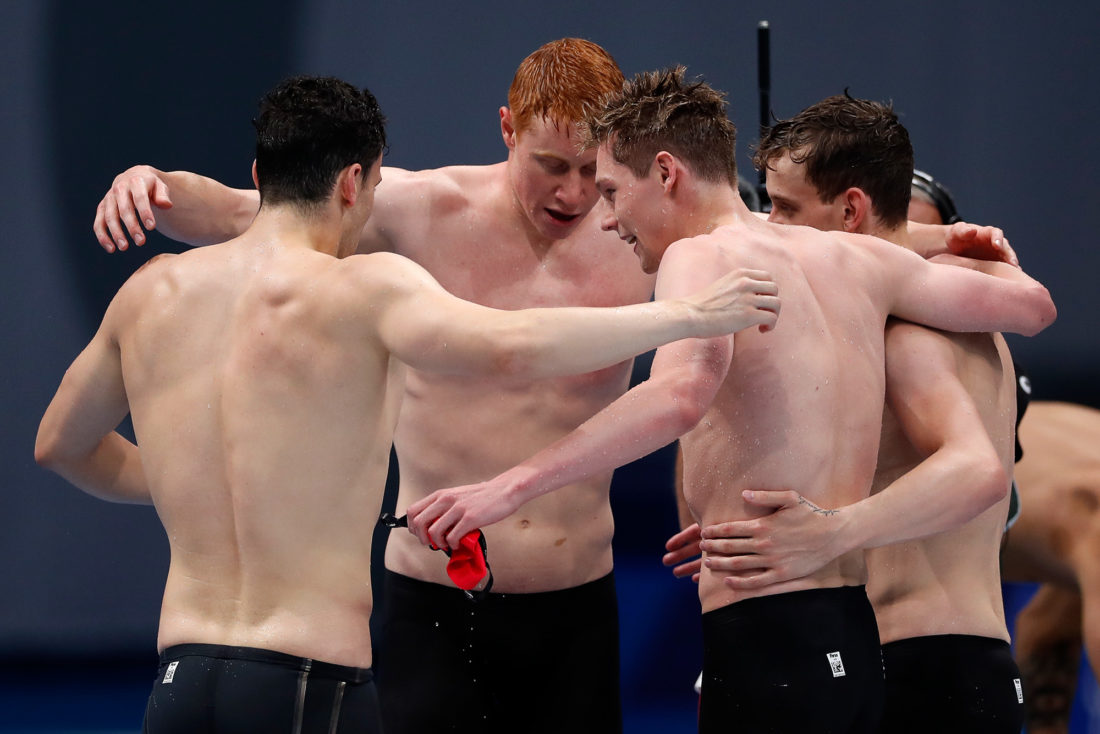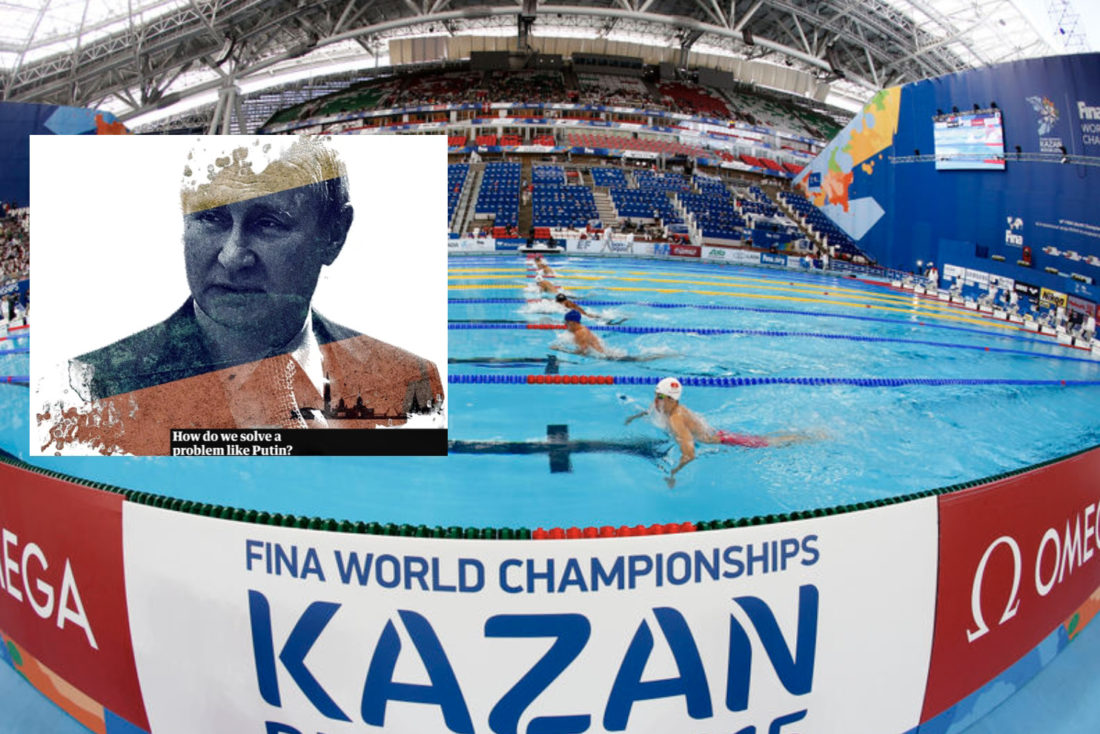Fair Play Cited As FINA Asked To Rethink Plan To Make Doha January 2024 Worlds The Olympic Relays Qualification Meet For All But Top 3 at Fukuoka 2023

FINA is being called on to drop what has been described as a plan to force national federations to send elite teams to a World Championships in Doha at the start of Olympic years in January 2024 against their wishes.
Widespread opposition to the timing of Doha, January 2024, took off soon after FINA revealed the time and place of the third in a series of annual World long-course Championships scheduled by FINA in a four-year period as part of moves driven, at least in part, by a wish to catch-up on contracts that could not be fulfilled as originally intended because of the Covid pandemic.
The mood among athletes and coaches soured after federations received a note from FINA informing them of a change to the conditions for relay qualification to the Paris 2024 Olympic Games.
National relay teams normally qualify for the Olympic Games by finishing in the top 12 at the World Championships in the year before the Games. Four remaining slots, to take the Olympic relay quota in each event to 16 teams, are then filled according to times recorded at a number of official qualification events during the year leading up to Games.
Now, however, FINA has told federations that only the top 3, the podium placers, in each relay at the World Championships scheduled for Fukuoka in July 2023 may automatically qualify for the Paris 2024 Olympics and that all others must attend Doha in January 2024 to gain access to the Games even though that is the time of years when most preparing for the Olympics are in a critical stage of preparation for what they intend to make the biggest moment of their careers, be that to make an Olympic team in trials season or excel at the Games proper.
In Budapest during the current World Championships, which draw to a close this weekend, State of Swimming was approached by more than a dozen senior figures from as many national teams in the pool who want FINA to rethink the whole thing.
As the pool swimming concluded last Saturday, Great Britain head coach Bill Furniss – whose Team GB squad celebrated its best Olympic ever in Tokyo last year, relays a key part of the success story – was asked by SOS for his opinion on the plan to have only three relays qualify for Paris 2024 at the Fukuoka 2023 Worlds, the rest required to do so as late at January 2024 in Doha. He replied:

“I think we have to be fair in Sport and I think, you know, I think if that was to happen, then it would be very unfair on all the swimmers in relays who are not qualified in the top three. We’ll see what happens. To me, it would be a question of fairness. I think if you qualify top three, it’s obvious to me that if that did happen, those teams would be at an advantage to everybody else.
“So hopefully we’ll see how that plays out but fairness is fundamental in sport. I’m hoping that federations sit down and some sensible talks take place.”
Bill Furniss – Photo: Swim shoal and family – (l-r) James Guy, Tom Dean, Duncan Scott and Matt Richards soak in their 4x200m Olympic gold gold – by Simone Castrovillari, courtesy of Speedo
Asked by SOS to explain the thinking behind the Fukuoka top 3 plan that would mean all others teams would effectively be forced to attend Doha to qualify relays for Paris 2024 and asked for its view on the fairness aspect of the question, FINA noted that the plan was not final, the ultimate arbiter of such matters the International Olympic Committee, though FINA is the organiser of the Olympic swimming event under the IOC system of governance.
A FINA spokesman said: “We cannot speculate publicly on the Olympic Qualification System for Paris 2024 before it is final.”
In line with Furniss’ hope that “sensible talks take place”, the FINA spokesman, in response to being asked if there was any chance of stakeholders having their strong views heard ion the matter, noted: “More than ever, FINA is committed to ensuring that all voices and opinions are heard and represented equally. FINA has already discussed the proposed qualification system with many athletes, coaches and administrators and such conversations are on-going.”
Whether such talks will influence the decision-making process remains to be seen: clearly, there are many nations who want fair and even qualification processes for Olympic relays, just as it is obvious that many nations are unhappy with the prospect of sending elite teams to Doha in January of Olympic year, the timing of which is, in the words of a coach to several Olympic podium placers, “ridiculous … not going to happen” as far as Paris podium prospects were concerned.
Many nations have expressed concerns over the timing of Doha 2024 and are hoping that sense prevails: Kazan, Russia, is the fourth and last of the venues scheduled to host one of the World Championships between 2022 and 2025 but many would now like to see Doha handed the 2025 event and have the January 2024 plan removed from the calendar to avoid what would be the first time a World long-course showcase being staged in the same year as an Olympic Games.
Doha 2025 would, many leading figures at the pointy end of performance believe, make much more sense at a time when a long healing process would be required before Russia would be welcome back into the sporting fold, and that assuming the Russian war on Ukraine is over, a peace deal is settled and reparations have been agreed.
As Russian missiles continue to rain down on the sovereign territory of Ukraine, the prospects of Russia being able to make it to Paris 2024 look extremely remote, a whole generation of Russian sports men and women now paying the price for Putin’s war.
Asked whether there was a chance of Kazan being told that the 2025 Championships it is scheduled to host will also have to be forfeited because of Putin’s war on Ukraine, which os late has also included serious threats being made against members of NATO and other nations allied to the West, FINA said: “FINA’s concerns remain a peaceful resolution to the war and support for the Ukrainian aquatics community for as long as it is needed. It is not able to comment any further at this time.”
Beyond relays & World Affairs, A January World Championships Is “Challenging”
Asked what challenges the staging of Doha Worlds in January 2024 would bring, Furniss said: “It would be very difficult, very difficult indeed, if that’s the case [Doha in January of Olympic year. It’s something we would have to sit down with our athletes and coaches and look at.
“So, I haven’t made any calls on it, Craig, and I’m not ducking the question, but to put a World Championships and Olympics in the same year? It’s challenging,” he added. “So that’s something we will have to sit down and look at. It could even move.”
Federations and national-team planners are acutely aware and even sympathetic with the arguments for holding four World Championships in four years, as opposed to the scheduling of the showcase once every two years, in years before and after an Olympics, the pattern since 2001, before which World titles were held once every four years, staged in mid-Olympic cycle.
However, they also believe that athlete welfare and ensuring athletes turn up in the best shape of their lives to the biggest opportunity of their lives to capitalise on many years of hard work top the need to honour contracts shoved sideways by a pandemic that has come at a cost, financial and otherwise, for many in many different situations and circumstances the world over.
One of several leading figures in the sport who expressed concern about Doha and Kazan in relation to athlete welfare but asked not to named in the hope that sensible discussion with FINA’s leadership would lead to solutions in the best interests of all, told SOS:

“The idea of having one Olympic-qualification rule for the relay medallists in Fukuoka and another for the rest so that we’ll all have to have all or some of our best in Doha is madness. The same goes for holding a January 2024 World Championships. It shouldn’t be on the calendar.
“It’s a big barrier to preparation cycles for Paris set in place a long time ago. We don’t plan four weeks out, or four months out. It’s a question of four-year and more planning.
“FINA should think hard about Kazan 2025 and its viability given the circumstances with Russia. Is it realistic to think that the reasons we can’t have Russians here in Budapest, especially alongside Ukraine athletes and teams, will no longer exist in 2023, 2024 and even 2025?
“They need two think about telling Kazan ‘sorry but like World short-course at the end of this year, we just can’t be there right now and the contract has to be cancelled’. Hand Doha 2025 and let’s get back to a traditional preparation cycle in the best interests of everyone.”
Photo: Kazan and the Kremlin – where sports and politics have mixed in FINA company. Main image: Kazan 2015 World Championship pool, by Patrick B. Kraemer; and inset, a screenshot of part of an image of Vladimir Putin by Observer Design
A selector form a third nation said: “There should be no attempt to force swimmers to race at a World Championships, especially one where the timing of the event raises a lot of problems for preparation plans and smacked of political interference. Athlete interest has to be the priority.”